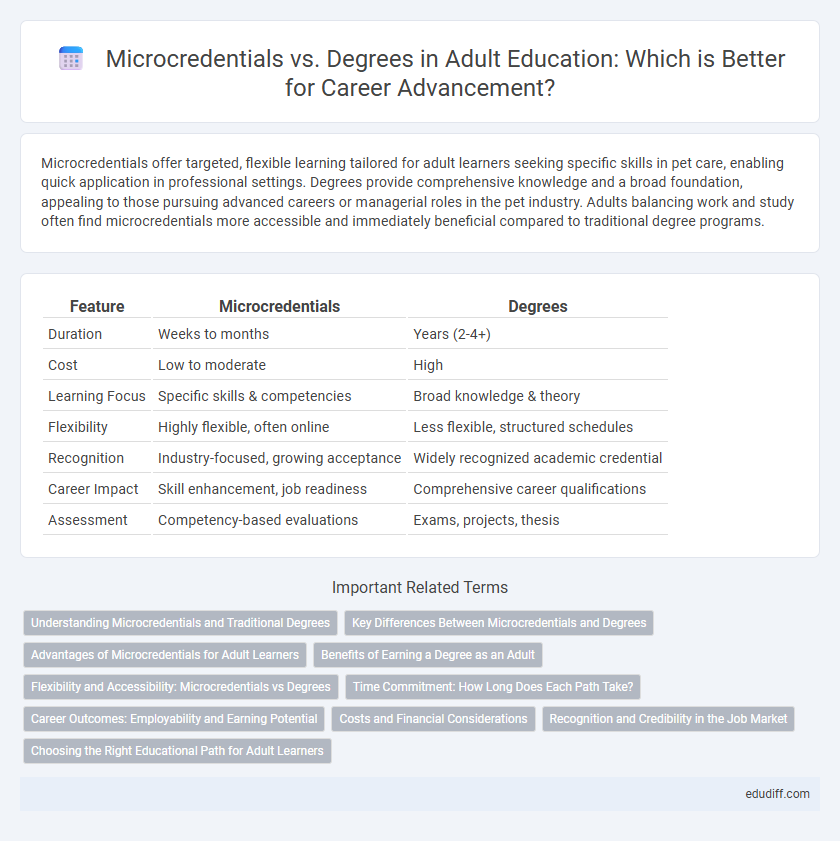Microcredentials offer targeted, flexible learning tailored for adult learners seeking specific skills in pet care, enabling quick application in professional settings. Degrees provide comprehensive knowledge and a broad foundation, appealing to those pursuing advanced careers or managerial roles in the pet industry. Adults balancing work and study often find microcredentials more accessible and immediately beneficial compared to traditional degree programs.
Table of Comparison
| Feature | Microcredentials | Degrees |
|---|---|---|
| Duration | Weeks to months | Years (2-4+) |
| Cost | Low to moderate | High |
| Learning Focus | Specific skills & competencies | Broad knowledge & theory |
| Flexibility | Highly flexible, often online | Less flexible, structured schedules |
| Recognition | Industry-focused, growing acceptance | Widely recognized academic credential |
| Career Impact | Skill enhancement, job readiness | Comprehensive career qualifications |
| Assessment | Competency-based evaluations | Exams, projects, thesis |
Understanding Microcredentials and Traditional Degrees
Microcredentials offer focused, skill-specific learning certified through short-term programs, ideal for professionals seeking rapid upskilling or career shifts without the extended time commitment of traditional degrees. Traditional degrees, such as bachelor's or master's programs, provide comprehensive education with broad theoretical foundations and recognized academic credentials valued across industries. Understanding the distinction highlights how microcredentials complement degrees by emphasizing practical expertise, while degrees ensure foundational knowledge and long-term career development.
Key Differences Between Microcredentials and Degrees
Microcredentials offer targeted skill mastery and flexible learning timelines, focusing on specific competencies relevant to industry demands, whereas degrees provide comprehensive, broad-based education with a structured curriculum and longer duration. Microcredentials are typically shorter, cost-effective, and stackable, enabling adults to upskill quickly without the commitment required by traditional degree programs. Degrees often carry more weight in academic and professional settings but may lack the agility and specialized focus that microcredentials deliver for immediate career advancement.
Advantages of Microcredentials for Adult Learners
Microcredentials offer adult learners flexible, targeted skill acquisition that aligns with fast-paced industry demands and career transitions. These short, competency-based programs are often more affordable and less time-consuming than traditional degrees, enabling learners to quickly enhance employability and practical expertise. Employers increasingly recognize microcredentials, facilitating adult learners' access to job opportunities and career advancement without the need for full degree completion.
Benefits of Earning a Degree as an Adult
Earning a degree as an adult enhances career advancement opportunities by demonstrating commitment and expertise to employers, often leading to higher earning potential. Degrees provide comprehensive knowledge and critical thinking skills, fostering long-term professional growth and adaptability in a rapidly evolving job market. Adult learners benefit from networking opportunities and access to resources that support continuous learning and career transitions.
Flexibility and Accessibility: Microcredentials vs Degrees
Microcredentials offer greater flexibility and accessibility compared to traditional degrees by allowing learners to acquire specific skills in shorter timeframes and often through online platforms. These credentials enable professionals to upskill or reskill without committing to multi-year degree programs, making education more adaptable to diverse schedules. The modular, stackable nature of microcredentials supports lifelong learning and responsive career development in rapidly changing industries.
Time Commitment: How Long Does Each Path Take?
Microcredentials typically require weeks to a few months to complete, offering a flexible and time-efficient alternative for adult learners seeking specific skills. In contrast, traditional degree programs generally demand a multi-year commitment, often ranging from two to four years for undergraduate degrees. This significant difference in time commitment allows microcredentials to cater effectively to adults balancing education with work and personal responsibilities.
Career Outcomes: Employability and Earning Potential
Microcredentials offer targeted skill development that enhances employability by meeting specific industry demands quickly, often leading to immediate job opportunities and salary improvements. Traditional degrees provide comprehensive knowledge and broader career options, typically resulting in higher long-term earning potential and eligibility for advanced professional roles. Employers increasingly recognize microcredentials for their practical relevance, but degrees remain a key credential for leadership positions and stable career advancement.
Costs and Financial Considerations
Microcredentials offer a cost-effective alternative to traditional degrees, often requiring significantly lower tuition fees and shorter completion times, which minimizes lost income from time away from work. Financial aid options for microcredentials are less prevalent than for degrees, but their affordability reduces reliance on loans and debt accumulation. Evaluating the return on investment, microcredentials can provide targeted skills that enhance employability with less financial risk compared to the higher upfront costs of degree programs.
Recognition and Credibility in the Job Market
Microcredentials offer targeted skills verification recognized by employers seeking specific competencies, often enabling faster entry or advancement in niche job markets. Traditional degrees provide broad, comprehensive knowledge with longstanding institutional credibility, valued for roles requiring deep theoretical understanding or leadership capacity. Job market recognition increasingly favors a combination of both, where microcredentials complement degrees to demonstrate practical expertise and adaptability.
Choosing the Right Educational Path for Adult Learners
Microcredentials offer adult learners targeted, industry-relevant skills with flexible, shorter time frames compared to traditional degrees, which provide comprehensive knowledge and broader career options. Prioritizing personal career goals, time availability, and financial considerations helps adults determine whether microcredentials or degrees align better with their professional development. Employers increasingly recognize microcredentials for upskilling, while degrees remain essential for roles requiring in-depth academic preparation.
Microcredentials vs Degrees Infographic

 edudiff.com
edudiff.com